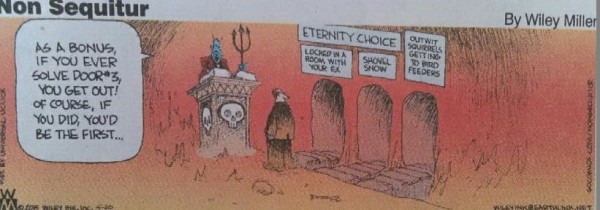At the end of this world and the beginning of the next, we will all stand before our Creator. He will judge each one of us. Of that fact, there is no doubt. The question is, what’s the difference with the damned? Why will some be forever cast into what God has termed “the lake of fire”? For that matter, why will some be spared such condemnation? There exists near the end of the book of Revelation a short passage that brings the essence of the difference into sharp focus. Let’s read it first:
“Then I saw a great white throne and him who was seated on it. From his presence earth and sky fled away, and no place was found for them. And I saw the dead, great and small, standing before the throne, and books were opened. Then another book was opened, which is the book of life. And the dead were judged by what was written in the books, according to what they had done. And the sea gave up the dead who were in it, Death and Hades gave up the dead who were in them, and they were judged, each one of them, according to what they had done. Then Death and Hades were thrown into the lake of fire. This is the second death, the lake of fire. And if anyone’s name was not found written in the book of life, he was thrown into the lake of fire.” (Revelation 20:11-15, ESV)
Here we have a summary of the judgment of people who will be forever damned. We notice first that not even the earth or sky itself can stand in the presence of God’s holiness as He begins the final judgment. There is, therefore, no refuge for anyone to escape or to have eased the devastation of what is about to take place. Notice, secondly, that all of the dead – both the great and the small – must stand before the throne. Your soul’s destiny depends not on how influential or wealthy you were in this life, and your status of seeming insignificance or poverty does not excuse you from judgment; all must stand before the throne.
The key component on which we want to focus here is the books that are opened. First, the Holy Spirit through the Apostle John tells us in this passage that “books were opened.” Then he adds that “another book was opened, which is the book of life” (verse 12). We clearly understand, then, that this one book of life stands out from the other books. There is a group of books which are unnamed, and there is the book of life.
We are informed that the dead – the “spiritually dead” that is – are judged by what is written in the unspecified books. The contents of these books must be the sinful acts of the damned, because we are told simultaneously that these people were judged “according to what they had done” (verse 12). And no one escapes; the sea (the troubled and sinful world, as I understand it) and all of Death and Hades had to give up the dead in their possession. In other words, no matter when these people had died, no matter if their spirits and bodies had long been separated from God or only shortly, no matter if their bodies had been in the ground for thousands of years or just a few moments, no matter where they had died, and no matter from where they came, death had to yield to God its power over people so that God could make His final, sovereign, and irrevocable judgment.
Death obeys … and gives them up. The solemn words of verse thirteen demonstrate the complete power of almighty God, as Death and Hades give up the dead and “they were judged, each one of them, according to what they had done” (verse 13). We observe here the repeating of the same phrase we saw in verse twelve. We read twice that the damned are judged by the things that they did. Their wrong, ungodly, and rebellious actions and words – their sins – are here resulting in an eternal destiny. On the basis of their own sins, they are forever damned to the lake of fire.
Verse fifteen adds one specific emphasis; those who end up in the lake of fire also did not have their names placed in the book of life. Not only do the condemned find themselves paying finally for their sinfulness, but their doom is doubly sealed, for their names are not recorded in the one book that stands alone – the book of life. Clearly, the one difference between the damned and the saved – between those who are put in the lake of fire and those who are not – is one factor. Is his or her name written in this book of life? If a name is not written in that one book, then all of his sins are heaped upon him at the end of time.
I want to make this point unequivocally plain: you will either be judged by your sins or judged by your inclusion in the book of life. You will either one day have the culmination of all the guilt and punishment for rebelling against God heaped on you as your sins are read from many books, or you will stand before the throne and hear only one thing called out to you – your name from the one book of life. All the sins that I have ever committed brought to me for damnation, or hearing God read my name from a book that ensures my safety and everlasting delight – those are the choices.
So how do we get our name in the book of life? We need to know the Owner of the book! We need to have a relationship with the Person to whom that book belongs! He is Jesus. Revelation 21:27 calls that one book “the Lamb’s book of life.” Revelation 13:8 labels it “the book of life of the Lamb who was slain.” There is only one Lamb with a capital “L.” There is only one slain Lamb that ultimately matters when it comes to my sin and my destiny. John the Baptist said it best, as recorded in the Gospel of John, chapter one, verse 29, “The next day he saw Jesus coming toward him, and said, ‘Behold, the Lamb of God, who takes away the sin of the world!’” The Apostle Peter corroborates John the Baptist’s statement in 1 Peter 1:18-19, “…knowing that you were ransomed from the futile ways inherited from your forefathers, not with perishable things such as silver or gold, but with the precious blood of Christ, like that of a lamb without blemish or spot.”
Jesus was the Lamb who was put to death for our sins. He spilled His own blood on the Cross of Calvary to pay for your sinfulness. When He gave up His life that day outside the gates of Jerusalem, He took your sin upon His own shoulders – IF you believe in Him. If you truly believe in the Jesus of the Cross, the Jesus of the Bible, the Jesus who invaded earthly history to die and rise again, the Jesus who is coming back one day, the Jesus who is the ONLY ONE who can pay for your sin and put your name in the wonderful book of life – if you believe in Him, you are safe from eternal condemnation and the lake of fire. This belief in Him must be real and applied. You have to believe in Jesus to the point that it changes your reality. To truly believe in Him means to accept all of His Word as revealed in the Bible. It means to completely change your mind about your sin and know in the deepest place of your heart that you need His blood and His forgiveness. It means to live with Him and for Him each day. It is a relationship.
If your name is in the Lamb’s book of life, then never will your sins be brought up to condemn you at the end of time. While the sins of the damned are reiterated as the evidence of their rightful judgment, the only thing you will hear is your name – called lovingly from the Lamb’s book. Why will you not hear your sins proclaimed? Because your sins were judged on the Cross with Jesus when He suffered and died. Your sins have been paid for – never to condemn you before God!
Oh, Jesus, how we love You! Dear Jesus, how we thank You! As the Apostle Paul put it in Romans 8:1, “There is therefore now no condemnation for those who are in Christ Jesus.” And we can joyfully add to this glorious statement the truth of the book of Revelation and know that there is no damnation and lake of fire for those whose names are written in Jesus’ book of life!
– Shelli S. Prindle


